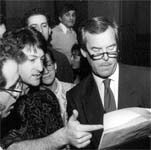 (from left) Peter Jennings, Rupert Murdoch, Mike Wallace
(from left) Peter Jennings, Rupert Murdoch, Mike Wallace
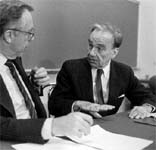 and Sen.Joseph Lieberman.
and Sen.Joseph Lieberman.

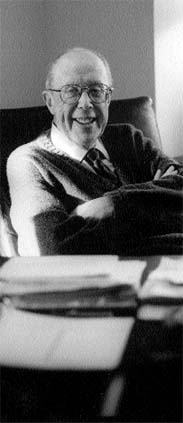
Jeff Storey '01
Squadron first became involved with Cardozo when Yeshiva University President Norman Lamm asked him to host a fundraising event for the fledgling law school. Squadron felt he owed that to Lamm, a friend who "was right there in an extraordinarily thoughtful and appropriate way" when the lawyer's first wife died.
The buzz about "new media" had not yet reached a deafening level, but Price, who was then dean of the Law School, saw the opportunity to build on Cardozo strengths in intellectual property and entertainment law. Squadron laughingly describes his collaborator as "one of those wildly enthusiastic people with lots of ideas." The program built by Price offers externships and fellowships for students, sponsors conferences and publications, and has created media think tanks in Moscow and Oxford, the first of what Price envisions as a global network of affiliated policy centers. "Most of these activities are favorites of Monroe's," Squadron says. "He's very good at putting these things together."
For his Conversation Series and other events,
Squadron invited friends like
 (from left) Peter Jennings, Rupert Murdoch, Mike Wallace
(from left) Peter Jennings, Rupert Murdoch, Mike Wallace
 and Sen.Joseph Lieberman.
and Sen.Joseph Lieberman.
Squadron also is pretty good at "putting things together." His own Rolodex reads like a who's who of the media industry, and he's been able to call on friends and clients like Rupert Murdoch, Mike Wallace, Larry Tisch, Peter Jennings, and Steve Ross to support the Squadron Program and to participate in a Conversation Series with Cardozo students and faculty that was, according to Price, "historical and remarkable." Squadron himself taught a course at the school in 1992-93. On June 10, YU has a dinner scheduled to honor Squadron. Co-chairmen for the event are New York Mets president and chief executive officer Fred Wilpon and Murdoch, whose media empire is a major client for the firm of Squadron, Ellenoff, Plesent & Sheinfeld, LLP.
"Rupert is a unique personality," Squadron says. "He's smart, and he has a memory like an elephant. There isn't a lot of discussion before decisions are made." Murdoch says that Squadron is "a very shrewd, tough, and hard-working attorney. But he has a strong sense of responsibility and a keen insight into the problems and opportunities presented by today's mass media. The Squadron Program is a very effective way to pass on those insights to the young people who will determine the industry's direction in the 21st century."
More Squadron Program Events have included
friends like (from left)
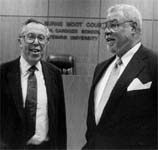 J.
Bruce Llewellyn, Abe Rosenthal, Steve Ross,
J.
Bruce Llewellyn, Abe Rosenthal, Steve Ross,
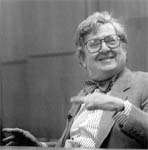 and
Ken Auletta.
and
Ken Auletta.
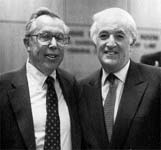

Squadron's involvement with Cardozo is consistent with his lifelong
commitment to social responsibility. He became a lawyer "at a time when
being a professional meant contributing to the community." He laments the
fact that law became more of a business in the 1980s, but he has remained
active in the arts and other community causes. He has been the chairman
of City Center 55th Street Theater Foundation since 1975 and, among other
activities, has served as the president of the American Jewish Congress,
the chairman of the Conference of Presidents of Major American Jewish Organizations,
and the founding president of the International Center of Photography.
When Squadron was starting his career, the news media were still relatively simple. "You had the red network, the blue network and CBS," he says. Fifty years after Squadron was admitted to the bar, traditional broadcast media face fierce competition from cable and satellite television and the Internet. Ever-expanding content is available in the blink of an eye, and Squadron frets that the multitude of new information sources has led to "a dumbing down" of the media. New technology is driving down the cost of producing and distributing information, while "bandwidth" is becoming a marketable commodity. Finally, different forms of communications are converging. The consolidation of communication companies is producing "a lot of 800-pound gorillas," Squadron says.
"What's new is the ubiquity of communications," says Kenneth Carter '98, who became the associate director of the Columbia Institute for Tele-Information after leaving Cardozo. "The world is becoming a much smaller place," says Gary Lutzker '93, who practices communications law in Washington, D.C. "You can just be anywhere and connect to anywhere else." The pace of change is dizzying, agrees third-year student Peter Yu. "Who knows what will happen tomorrow?"
These developments have created exciting challenges for lawyers. Familiar legal issues like censorship, copyright, and regulation keep cropping up in new contexts. Domestically, policy makers are working to craft a legal environment to spur competition and encourage advances in telecommunications. Internationally, officials in transitional societies like Russia and its former satellites are writing laws aimed at promoting a free press and a marketplace of ideas. Those efforts are important to Americans who are concerned about the survival of democratic institutions. After all, says Squadron, "democracy is our most important export."
The Squadron Program incorporates a model of legal education that tries to give students as much practical experience as possible early in their law school careers. "It is crucial in ensuring that Cardozo students who pursue careers in media law have an in-depth and sophisticated understanding of this constantly evolving area of the law," Price says. Susan German '88, who works for the Federal Communications Commission, says that the Squadron Program director is an effective mentor for students who are interested in media policy. "Monroe is a big deal in the communications field," she says. "He's very well-respected. He sees things before they're coming."
The Squadron Program exposes Cardozo students to the future of telecommunications through specialized courses in issues like media globalization and the regulation of electronic media. It also places students at nonprofit agencies like the Tele-Information Institute, the Authors Guild, the Libel Defense Resource Center, and media research centers around the world. Former students say that this mixture of the academic and the practical gave a real boost to their careers.
Carter says that working for nonprofit agencies like the Tele-Information Institute gives students essential training in the "nuts-and-bolts issues" of telecommunications law, a "complex and involved field." When Lutzker was looking for his first job, Congress had just passed the 1992 telecommunications law since replaced by the 1996 law and "nobody knew what it was about. I had just spent a year in class dissecting it." That led to a position with the New Jersey agency that oversees cable television.
The experience Marc Szafran '96 got as a Squadron Fellow was "invaluable preparation" that "put me in the position of stepping out of law school and getting the kind of job I wanted" at the New York City Department of Information Technology and Telecommunications. In May, he left the city agency for a position as general counsel with the interactive and on-line division of the Entertainment Software Ratings Board, the leading software rating body serving the interactive software industry. Szafran was introduced to such issues at a conference he helped organize at Cardozo, "The V-Chip and the Jurisprudence of Ratings." (The V-Chip conference was the basis of a special issue of the Cardozo Arts and Entertainment Law Journal and a book published last year by Lawrence Erlbaum Associates.)
Szafran's division, which includes both legal and business people, will develop and implement legal and business mechanisms "that will create a safe, comfortable forum on the Internet for consumers to exchange accurate information and conduct electronic transactions." His duties will include working with more than 250 leading interactive companies (including Nintendo, Electronic Arts, and Sony), the US Department of Commerce, the Federal Trade Commission, and prominent industry organizations and associations. There has been concern about Internet privacy issues like the collection and use of personally identifiable information and the access of third parties to that information. If the software industry can develop its own "meaningful and effective" guidelines, as it did for computer video games, "the government will not have to come in and regulate, and we'll be doing a service for our clients and the online public at large," Szafran says.
There are plenty of domestic communications issues like content ratings and cable television deregulation that Squadron Program participants can focus on, but Price's vision for the program does not stop at the water's edge. The Squadron Program seeks to prepare students for issues and opportunities that are international in scope. "Not only does Cardozo have a really strong communications program," Price says. "It's one of the few with a truly global reach."
Cardozo's Post-Soviet Media Law and Policy Newsletter, for which
students perform on-line research, tracks changes in communications law
and policy in the former Soviet Union and in Central and Eastern Europe.
It is published about 10 times a year. The December 1998 issue reported
complaints by Serbian authorities of "information subversion" in Kosovo
and calls from the Russian Communist Party for a clampdown on the "radical
liberal" news media.
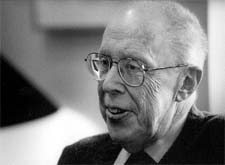
As an outgrowth of the newsletter, Price in 1995 helped Russian colleagues
establish the Moscow Media Law and Policy Center to study ways in which
the rule of law can promote the growth of a free and independent press.
The Moscow Institute "is training a whole generation of lawyers and journalists,"
Price says. The Squadron Program has helped its Moscow partners obtain
funding, arrange internships for Russian journalists at American nonprofit
agencies, organize conferences, publish textbooks and a Russian-language
monthly newsletter with seven regional supplements.
"Monroe Price is rightly considered the godfather of the center," says Andrei Richter, the Moscow Center's director. "Without his thinking, initiative, strong belief in change here in Russia, nothing would have worked with the establishment of our institution. The know-how of the Cardozo faculty and assistance of staff and students have been of great help as well." Price hopes that more Cardozo faculty members and students will tap into the Moscow Center resources. "We're all learning together," he says.
The Russian Law on Mass Media, passed seven years ago, confirmed a ban on censorship and created favorable conditions for the development of independent publications. Nevertheless, Richter says there are "tremendous gaps" in Russian media legislation. The Squadron Program currently is helping the Moscow Center draft a model telecommunications law for the country, which is, says Richter, a crucial step in the creation of "a civilized legal environment in the Russian community." Peter Yu, who functions as managing editor of the Post-Soviet Media Law and Policy Newsletter, attended a media law conference in St. Petersburg in February and has begun collecting laws, FCC regulations, court cases and other materials that will be used by the Moscow Center in writing the law. Yu says that the Russians cannot be expected to adopt legal rules without change. They will need time to study which aspects of American law can work under Russian conditions. Meanwhile, as the result of a 1997 conference sponsored by the Squadron Program, Price has received a contract from the US government to study how media law can be used to strengthen democratic tendencies in Russia and other transitional societies.
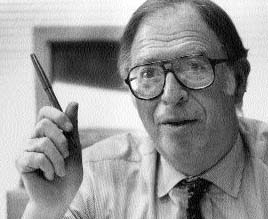
Perkovich and his British colleagues recently completed a six-month study for the European Union on television and the protection of minors. They concluded that the V-Chip content-filtering device used in the United States and Canada "doesn't really make sense in a European setting." Perkovich is working on several other European Union studies related to "the information society." The Oxford organization also supports the work of the Moscow Media Law and Policy Center.
Price helped the British program get a two-year grant from the Markle Foundation in 1997 and says it "is on the threshold of a substantial expansion." He envisions it as a hub for similar institutions studying media law in Latin America, Asia, and Africa. Signs of the broadening focus are already visible. In 1997, the Squadron Program and its British partners cooperated in a study of broadcast reform in India that was published in the Cardozo Journal of International and Comparative Law. And Cardozo graduate Michael Likosky '97 is studying Malaysian media law and policy at Oxford, where he is a D.Phil. candidate.
Andrei
Richter, director, Moscow Media Law and Policy Center

Cardozo also runs a two-week introductory media course at Oxford for entering law school students. John Duffy of Cardozo was among three professors who taught during the program's first summer. Prof. Angela Campbell, director of the Citizens Communication Center at Georgetown Law School, and Stefaan Verhulst, director, Programme in Comparative Media Law and Policy at Oxford, were the other faculty members in 1998. "This program provides an extraordinary opportunity for entering students to be introduced to the telecommunications field," explains Duffy. "The environment at Oxford is perfect for teaching telecommunications from a comparative, global perspective." In the future, Price hopes to increase the contacts between Cardozo and the British media law program. For the moment, though, Perkovich says, "Cardozo brings a lot to Oxford, and Oxford brings a lot to Cardozo."
All in all, Price says that the Squadron Program has accomplished "some pretty amazing things" with relatively modest resources. Additional money would cement its position. For example, funds could be used to offer scholarships to attract talented students interested in telecommunications law. Luring more such students would be the big payoff for Cardozo. Price also wants to continue expanding the network of international centers the Program has spawned and thinks it should be paying more attention to issues surrounding the Internet.
Throughout the development of the program, Howard Squadron has been
"an extraordinary friend and counselor" to the program named for him, says
Price. "I'm not a letterhead person," says the 72-year-old lawyer, who
still works four days a week. Squadron jokes that he hasn't decided "what
to be when I grow up." He remains intrigued, however, by the conjunction
of the media industry, freedom of speech, and globalization issues. In
fact, he can't wait to sit down with Price after the dinner for a full-scale
discussion of the future of the Program that "has done me proud."